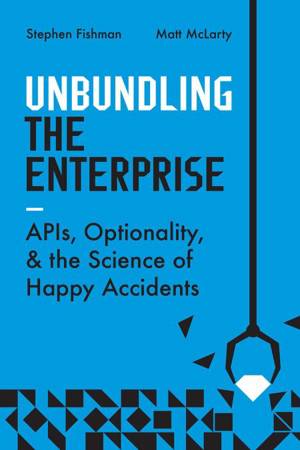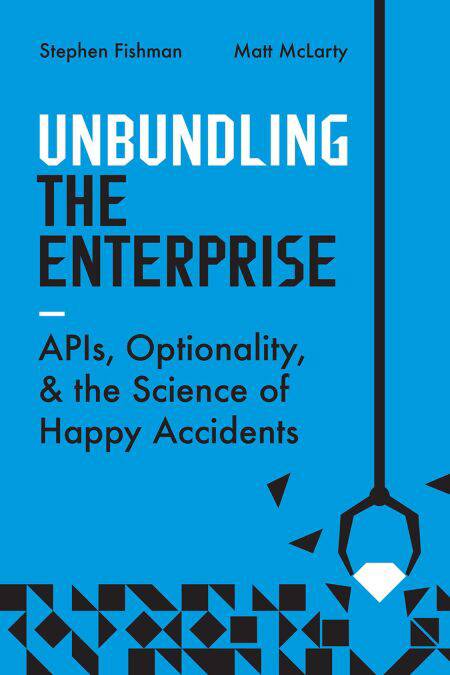
- Afhalen na 1 uur in een winkel met voorraad
- Gratis thuislevering in België vanaf € 30
- Ruim aanbod met 7 miljoen producten
- Afhalen na 1 uur in een winkel met voorraad
- Gratis thuislevering in België vanaf € 30
- Ruim aanbod met 7 miljoen producten
Zoeken
Unbundling the Enterprise E-BOOK
APIs, Optionality, and the Science of Happy Accidents
Stephen Fishman, Matt McLarty
E-book | Engels
€ 23,48
+ 23 punten
Omschrijving
“Unbundling the Enterprise…blew me away. It is a combination of some of my favorite books: Dr. Carliss Baldwin's Design Rules and Eric Evans's Domain Driven Design with the strategic insights akin to Good to Great and Reengineering the Corporation.”
—Gene Kim, researcher and bestselling author of The Phoenix Project and Wiring the Winning Organization
Unbundling the Enterprise provides a blueprint for organizations to remain relevant and maximize growth in the digital economy by embracing the flexibility and optionality enabled by APIs.
Drawing on real-world examples of both innovative “digital pirates” and legacy “digital settlers,” authors Stephen Fishman and Matt McLarty articulate strategies to unbundle business capabilities into reusable digital assets. These building blocks can then be rapidly combined and recombined to capitalize on new opportunities and innovations as they emerge.
For business and technology leaders, Unbundling the Enterprise provides an actionable methodology to engineer “happy accidents” and sustainable success in turbulent times. Underpinning their strategy are techniques tailored for digital business, like using APIs to create widespread optionality, designing digital business models focused on value exchange, and optimizing outcomes through tight feedback loops.
More than copying the superficial traits of digital pioneers, this book reveals the deeper mindset shift required to continually capitalize on unanticipated opportunities enabled by rapid technology innovation.
—Gene Kim, researcher and bestselling author of The Phoenix Project and Wiring the Winning Organization
Unbundling the Enterprise provides a blueprint for organizations to remain relevant and maximize growth in the digital economy by embracing the flexibility and optionality enabled by APIs.
Drawing on real-world examples of both innovative “digital pirates” and legacy “digital settlers,” authors Stephen Fishman and Matt McLarty articulate strategies to unbundle business capabilities into reusable digital assets. These building blocks can then be rapidly combined and recombined to capitalize on new opportunities and innovations as they emerge.
For business and technology leaders, Unbundling the Enterprise provides an actionable methodology to engineer “happy accidents” and sustainable success in turbulent times. Underpinning their strategy are techniques tailored for digital business, like using APIs to create widespread optionality, designing digital business models focused on value exchange, and optimizing outcomes through tight feedback loops.
More than copying the superficial traits of digital pioneers, this book reveals the deeper mindset shift required to continually capitalize on unanticipated opportunities enabled by rapid technology innovation.
Specificaties
Betrokkenen
- Auteur(s):
- Uitgeverij:
Inhoud
- Aantal bladzijden:
- 256
- Taal:
- Engels
Eigenschappen
- Productcode (EAN):
- 9781950508884
- Verschijningsdatum:
- 9/09/2024
- Uitvoering:
- E-book
- Beveiligd met:
- Adobe DRM
- Formaat:
- ePub

Alleen bij Standaard Boekhandel
+ 23 punten op je klantenkaart van Standaard Boekhandel
Beoordelingen
We publiceren alleen reviews die voldoen aan de voorwaarden voor reviews. Bekijk onze voorwaarden voor reviews.







